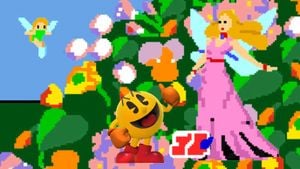Pac-Land
| Pac-Land | |
|---|---|
 File:PacManSymbol.png Pac-Man on the stage. | |
| Universe | Pac-Man |
| Appears in | SSB4 (Wii U) |
| Availability | Unlockable |
| Tracks available | PAC-MAN'S PARK / BLOCK TOWN PAC-MAN PAC-MAN (Club Mix) Namco Arcade '80s Retro Melody 1 Namco Arcade '80s Retro Melody 2 Libby Rabble Retro Melody Sky Kid Retro Melody Metro-Cross Retro Melody Yokai Dochuki Retro Melody Bravoman Retro Melody |
| Article on Wikipedia | Pac-Land |
Pac-Land (パックランド, Pakkurando) is a stage that appears exclusively in Super Smash Bros. for Wii U.
Layout
Similar to Mushroomy Kingdom from Brawl and 3D Land from the 3DS version, it is a side scrolling stage. The stage follows the layout of the original Pac-Land game, traveling through the town level, the bridge level, the mountain level, and ending at the fairy world (which was just a goal in the original game). After this, the stage scrolls back to the left, mimicking Pac-Man's return trip in the original game as well. The stage will proceed into at least "trip 2" of the original game.
The town section features fire hydrants, which spurt water that pushes fighters back; unlike Pac-Man's summoned ones, however, they cannot be knocked away. The bridge area includes geysers that can move up and launch players into the air. This stage contains water, but it cannot be swum in; instead, the player will simply fall through it.
The mountain level serves as the Omega version of this stage.
Origin
The stage is based off of the arcade game, Pac-Land. The game was a side-scroller where one would go through three levels to bring a fairy to its home and then go through a level incorporating elements of the last three in the opposite direction to get home. The game is notable for being one of the first to use parallax scrolling (where the foreground and background move at different speeds to simulate perspective), long before it became a gaming mainstay in the 16 bit era, and also the first game to feature the more anthropomorphic design of Pac-Man in-game. Interestingly, the version published by Midway in the United States featured the character designs from the Hanna-Barbera Pac-Man cartoon. Pac-Land was later used in future Pac-Man games, yet with different designs. Its most notable modern appearance is in the second installment of the Pac-Man World trilogy being Pac-Man World 2.
Gallery
Pac-Man, Toon Link, Yoshi, and Male Wii Fit Trainer in Fairy Land.
Rosalina next to the Fairy Queen.
- Pac-LandΩ.jpg
|
| |
|---|---|
| Fighter | Pac-Man (SSB4 · SSBU) |
| Assist Trophy | Ghosts |
| Stages | Pac-Maze · Pac-Land |
| Trophies and Spirits | Trophies · Spirits |
| Music | SSB4 · Ultimate |
| Masterpiece | Pac-Man |




